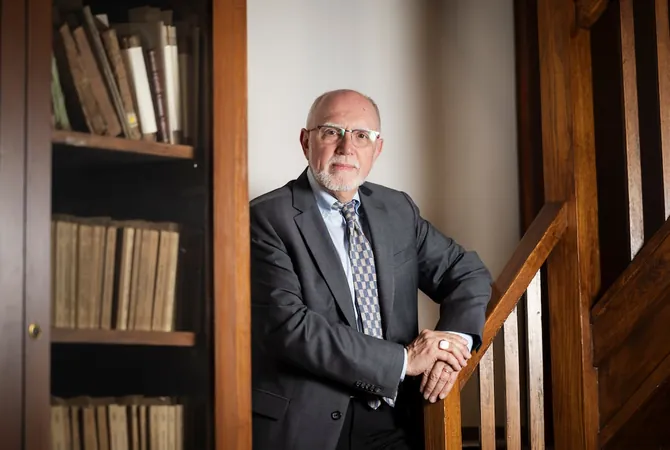
Unlocking the Mystery of Music: How It Influences Our Minds, According to Neuroscientist Robert Zatorre
2025-06-17
Author: Siti
Renowned neuroscientist Robert Zatorre, 70, recalls his earliest brush with music, which was a soundtrack of The Beatles and other iconic bands. Growing up in Buenos Aires, he dreamt of impressing girls by joining a rock band as an organ player. This ambition took a turn when his musical journey led him to Johann Sebastian Bach, an unexpected revelation that shaped his future.
Zatorre's passion for music and science flourished in the 1970s, a time when few ventured into the realm of music and neuroscience. Today, he’s a distinguished professor at McGill University's Montreal Neurological Institute and a leading figure in understanding how music engages the brain.
The Neuroscience of Music: More than Just Sound
In an exclusive interview at the University of Barcelona, following the receipt of an honorary degree for his groundbreaking work, Zatorre delved into how music permeates various cognitive functions, influencing emotion, memory, and even motor skills.
"Music touches every cognitive function," he emphasizes, highlighting how auditory experiences are intricately linked to our physical movements. Research indicates that certain rhythms activate motor areas in the brain, suggesting a biological basis for why we instinctively dance to music.
The Pleasure Principle of Music
But why do we find music so pleasurable? Zatorre explains that listening to emotionally charged music can trigger the brain’s reward circuit — areas typically responsive to basic survival stimuli like food or sex. This connection reveals the profound emotional impact music holds, despite its lack of direct survival necessity.
Evolutionary Insights: Why Music Matters
From an evolutionary point of view, Zatorre proposes that music may have emerged as a byproduct of our advanced auditory system, initially offering pleasure without a survival function. Yet, its significance expanded, fostering social bonds and distinct group identities, especially noted among teenagers who often adopt music preferences to differentiate themselves from previous generations.
The Music Experience: Not for Everyone?
Interestingly, Zatorre and his colleagues found that about 2% to 4% of people exhibit a disinterest in music, unable to understand its appeal. This group's unique neurological wiring shows a reduced connection between auditory processing areas and reward circuits, marking them as an exception rather than the norm.
The Therapeutic Power of Music
Music isn't merely a source of joy; it also holds therapeutic potential. Modern music therapy has advanced significantly and now relies heavily on scientific principles. For instance, Zatorre cites Finnish researchers who teach individuals with aphasia to sing, which aids in vocal cord development and elicits emotional responses, showcasing music's power to heal.
The Final Note: Music's Role in Humanity
After decades of research, Zatorre concludes that music’s role extends beyond just happiness. It's a profound tool for communication and emotional expression, a universal language that binds us together.
Future Questions in Neuroscience
Yet, questions linger. Zatorre is keen to explore how different brain regions interact during musical experiences, seeking to unlock the intricate connections that define our musical cognition. In a world where no single brain area governs music, understanding this network remains an exciting frontier.


 Brasil (PT)
Brasil (PT)
 Canada (EN)
Canada (EN)
 Chile (ES)
Chile (ES)
 Česko (CS)
Česko (CS)
 대한민국 (KO)
대한민국 (KO)
 España (ES)
España (ES)
 France (FR)
France (FR)
 Hong Kong (EN)
Hong Kong (EN)
 Italia (IT)
Italia (IT)
 日本 (JA)
日本 (JA)
 Magyarország (HU)
Magyarország (HU)
 Norge (NO)
Norge (NO)
 Polska (PL)
Polska (PL)
 Schweiz (DE)
Schweiz (DE)
 Singapore (EN)
Singapore (EN)
 Sverige (SV)
Sverige (SV)
 Suomi (FI)
Suomi (FI)
 Türkiye (TR)
Türkiye (TR)
 الإمارات العربية المتحدة (AR)
الإمارات العربية المتحدة (AR)